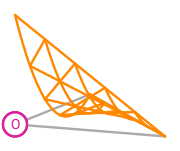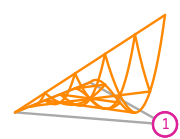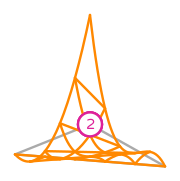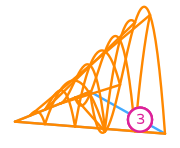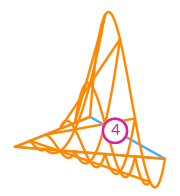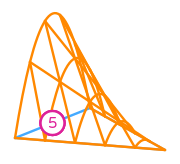an encyclopedia of finite element definitions
Degree 1 transition on a triangle
◀ Back to transition definition page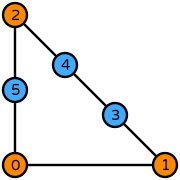
- \(R\) is the reference triangle. The following numbering of the sub-entities of the reference cell is used:
- \(\mathcal{V}\) is spanned by: \(1\), \(x\), \(y\), \(x \left(x^{2} + x y - 2 x - y + 1\right)\), \(x^{2} \left(- x - y + 1\right)\), \(y \left(- x - y + 1\right)\)
- \(\mathcal{L}=\{l_0,...,l_{5}\}\)
- Functionals and basis functions:

\(\displaystyle l_{0}:v\mapsto v(0,0)\)
\(\displaystyle \phi_{0} = - \frac{9 x^{3}}{2} - \frac{9 x^{2} y}{2} + 9 x^{2} + \frac{13 x y}{2} - \frac{11 x}{2} + 2 y^{2} - 3 y + 1\)
This DOF is associated with vertex 0 of the reference cell.
\(\displaystyle \phi_{0} = - \frac{9 x^{3}}{2} - \frac{9 x^{2} y}{2} + 9 x^{2} + \frac{13 x y}{2} - \frac{11 x}{2} + 2 y^{2} - 3 y + 1\)
This DOF is associated with vertex 0 of the reference cell.
\(\displaystyle l_{1}:v\mapsto v(1,0)\)
\(\displaystyle \phi_{1} = \frac{x \left(9 x^{2} + 9 x y - 9 x + 2\right)}{2}\)
This DOF is associated with vertex 1 of the reference cell.
\(\displaystyle \phi_{1} = \frac{x \left(9 x^{2} + 9 x y - 9 x + 2\right)}{2}\)
This DOF is associated with vertex 1 of the reference cell.
\(\displaystyle l_{2}:v\mapsto v(0,1)\)
\(\displaystyle \phi_{2} = y \left(2 x + 2 y - 1\right)\)
This DOF is associated with vertex 2 of the reference cell.
\(\displaystyle \phi_{2} = y \left(2 x + 2 y - 1\right)\)
This DOF is associated with vertex 2 of the reference cell.
\(\displaystyle l_{3}:v\mapsto v(\tfrac{1}{3},0)\)
\(\displaystyle \phi_{3} = \frac{9 x \left(3 x^{2} + 3 x y - 5 x - 2 y + 2\right)}{2}\)
This DOF is associated with edge 0 of the reference cell.
\(\displaystyle \phi_{3} = \frac{9 x \left(3 x^{2} + 3 x y - 5 x - 2 y + 2\right)}{2}\)
This DOF is associated with edge 0 of the reference cell.
\(\displaystyle l_{4}:v\mapsto v(\tfrac{2}{3},0)\)
\(\displaystyle \phi_{4} = \frac{9 x \left(- 3 x^{2} - 3 x y + 4 x + y - 1\right)}{2}\)
This DOF is associated with edge 0 of the reference cell.
\(\displaystyle \phi_{4} = \frac{9 x \left(- 3 x^{2} - 3 x y + 4 x + y - 1\right)}{2}\)
This DOF is associated with edge 0 of the reference cell.
